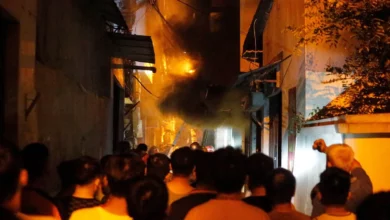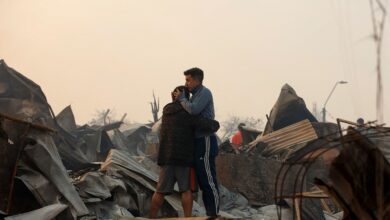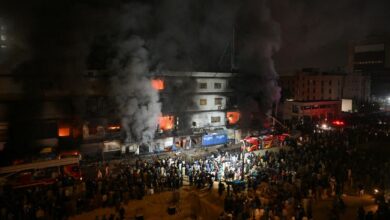"The Burning of the Cairo Opera," a new documentary from veteran director of photography Kamal Abdel-Aziz, recalls the shock around Egypt and the world when, in October 1971, the Old Opera in downtown Cairo suddenly burned to the ground.
Produced by Abdel-Aziz's company, Cadrage, "The Burning of the Cairo Opera" is his writing and directorial debut, and also signifies a departure from his typical focus. Abdel-Aziz made a name for himself in the 1990s working on mainstream films with acclaimed Egyptian filmmakers such as Mohamed Khan, Dawood Abdel-Sayed, Aly Abdel-Khaled and Inas El-Degeidhy. For the 40-minute documentary, which premiered last Saturday in a special screening at the High Cultural Council, he spent three years researching, shooting and editing. An academic audience from across different disciplines and practices as well as filmmakers, enthusiasts and critics watched the film, which Abdel-Aziz screened that night twice in a row.
Abdel-Aziz was driven to make the documentary for many reasons: Growing up in downtown Cairo, he has a nostalgia for the neighborhood and its history, and has for years devotedly collected old photography negatives made in Egypt since the end of the 19th Century. Among the thousands of pictures he gathered from different sources–sometimes from second-hand salesmen ignorant of their value–Abdel-Aziz found himself amassing a collection of photographs and documents on the Old Opera (otherwise known as the Khedivial Opera House, after Khedive Ismail, who founded it in celebration of the opening of the Suez Canal in 1869).
Part of Abdel-Aziz's success comes from a crucial and effective cinematic choice to not use any kind of narration or voiceover. Sound and images, along with the testimony of the thirteen interviewees he tracked down, attempt to tell the story of the Old Opera. And some of the revelations and recollections are quite astonishing.
Dr. Magda Saleh, the former prima ballerina of Egypt, reveals that the firefighters did not move immediately to stop the fire, but waited for an official order of the government. “The irony is that Old Opera was right next to the fire department," she recalls. Dr. Ratiba al-Hifni, a former Opera singer, expresses her surprise at the speed of the fire, which erupted from the four corners of the Old Opera at the same time. Musician Abdel-Hamid Gad remembers the shortcomings of the firefighters, whose hoses had insufficient water pressure to contain the flames. The wooden building of the Old Opera burned dramatically to ashes in only ten hours.
In addition to photos of shows that were performed on stage at the Old Opera, including the opera Aida (now celebrating its anniversary at the new Opera House in Gezirah), Abdel-Aziz succeeded in finding the most valuable documentation: an 8mm amateur film shot by a passerby of the burning Opera House. It is the only moving footage of the fire and the negligence of the authorities in saving it. The footage shows how Opera Square was a scene of slapstick incompetence, with soldiers and firefighters aiming dripping pipes everywhere except at the flames. Abdel-Aziz convinced the widow of the amateur filmmaker to sell him this valuable archive; the husband originally dreamed of selling it for millions of dollars.
The Burning of the Cairo Opera is good piece of investigative reporting with interviews with musicians, singers, dancers and intellectuals who performed inside the Old Opera and then witnessed its burning. Still, it does not offer satisfying answers to the mystery behind this incident. In fact, the documentary leaves the viewer with more questions than answers. The fire is like an Egyptian "X-File."
The final scenes of the documentary show two interviewees, opera singer Violette Magar and pianist Aldo Miniatto, now in their eighties, trying to perform but both failing due to their old age. The camera catches their tears. The poignant scenes serve as a visual metaphor from Abdel-Aziz about how these symbols of a golden era of Egyptian stage are vanishing, just as the burning of the Old Opera marked the end of an era when music and art were enlightening the Egyptian people.
We now live in a time not of opera houses but of commercial malls. A trip to the site of the Old Opera proves this: what used to be a dynamic performance space is now a multistory concrete car garage, ironically called Opera Garage, on Opera Square.




